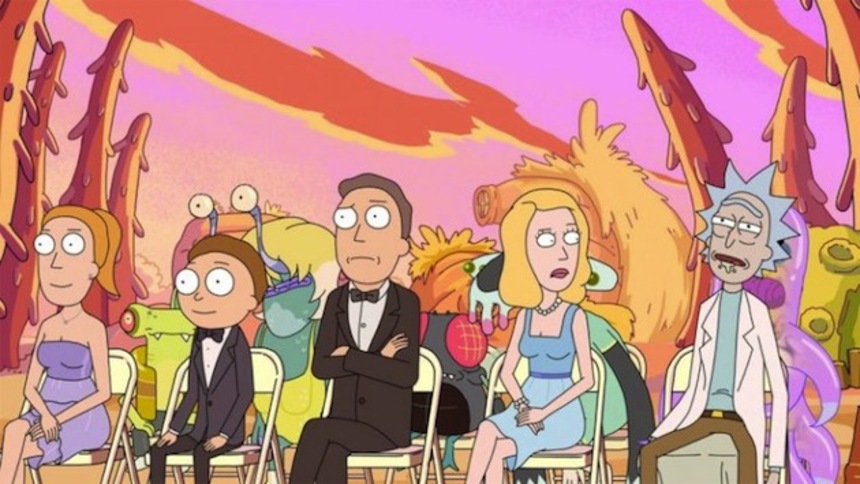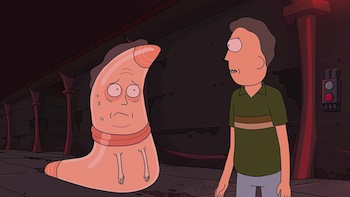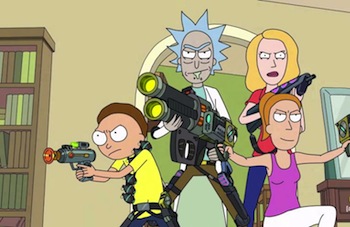RICK AND MORTY And The Multiplicity Of Loneliness

Big words, right? Okay, let's hold on a moment and back up a bit.
For those not in the know, Rick and Morty is an animated sci-fi show about an alcoholic scientist and his teenage grandson cavorting around the universe ala Doctor Who. It was created by Channel 101 goof Justin Roiland and Community mastermind Dan Harmon. It is a show full of absurd, often juvenile humor that leaves my inner adolescent reeling with laughter. So how can a show like that also be chock full of such deeply profound and resonant pathos that it nearly makes me weep at my own existence?
Through its two seasons Rick And Morty has steadily become a tragic-comedy about a self-righteous genius who can clone himself multiple times over, create a micro-verse inside his car battery, and save the Earth by singing a song that features the lyrics "...drop your pants and your panties, take a shit on the floor...", yet who struggles to believe in love, or that being together is worth anything. This is a man that believes loneliness is the perpetual state of being. Oh, and don't forget, through all this the show is still amazingly absurd and hilarious.
As season 2 hummed along, making me pause often, for I was gasping after a laugh, I also began to contemplate the idea behind the title of this article. While a sci-fi show like Rick And Morty deals with big universe bending concepts often, this season kept returning to ideas around clones, monster manifestations of perceived selves, multiple timelines, universes within universes, television from infinite dimensions... Ideas, settings, stories all about multiplication by some degree or another. This generally saw Rick and Morty (and more so than season 1, Morty's Sister Summer and his squabbling parents Beth and Jerry) in the middle of some wacky intergalactic adventure.
But the existential well was running deep here. The notion that lonely beings were perpetuating that loneliness anyway they could, only seeing as such, even across multiple iterations of selves and universes, was one hell of a gut punch. As such, using sci-fi devices as direct conduits for dealing with emotional states, something of which Rick is terrified of (but would never admit), beautifully honors the humanist traditions of the genre. The pathos is indeed strong.
To understand this from a newbie's perspective, we need to consider a few things about the history of Rick Sanchez and his daughter's family, the Smiths. Rick abandoned Beth as a child. We know absolutely nothing about her mother, other than that the marriage didn't stick. At the start of the show Rick has only recently returned to Beth's life. She is now married with two teenagers. Her husband Jerry, the high school sweetheart who knocked her up, consistently worries she'll leave him.
Many of the Jerry and Beth stories deal with this kind of worry, often ending in the two passionately rekindling their romance. The sitcom trope repetition of this has become a solid in-joke on the show. Here is a household that runs rampant with the paranoia of loneliness. Beth and Jerry are deathly afraid of that loneliness, but keep pushing towards it anyway. This is the perfect example of a modern, fractured couple caught in the shadows of the future and the past, and ignoring the present moment.
 The most epic culmination of all this occurs when Beth and Jerry are sent to an intergalactic couples counseling center that physically manifests your partner's perception of you into a living breathing monster. The Beth monster (resembling the Alien Queen) is determined to make an army of Jerrys as these wormy little man-things would be the most subservient creatures in the galaxy. As the monster Beth and Jerry work together to break out, the head counselor screams "Oh my god they're co-dependent!"
The most epic culmination of all this occurs when Beth and Jerry are sent to an intergalactic couples counseling center that physically manifests your partner's perception of you into a living breathing monster. The Beth monster (resembling the Alien Queen) is determined to make an army of Jerrys as these wormy little man-things would be the most subservient creatures in the galaxy. As the monster Beth and Jerry work together to break out, the head counselor screams "Oh my god they're co-dependent!"
Could Beth be repeating the mistakes of her parents? And what is she trying to prove to her estranged father?
Please note: Spoilers for the season 2 finale are ahead.
It wasn't until last night's season 2 finale that we actually found out Rick is a full-on terrorist, wanted by the Galactic Federation. From all his anti-government shenanigans and exploits over the seasons, we could certainly have gathered as such (We already knew he uses Morty on his adventures because his grandson's lower IQ brainwaves act as a shield for his super IQ brainwaves, not to mention the thousands of Ricks who have banded together across multi-verses to stand against the federation, with our Rick acting as the lone wolf, or "The Rickest Rick"). But with last night's reveal, it now devastatingly makes sense that Rick did not return home to Earth because he wanted to reconnect with his estranged daughter and her family, but because Earth was a planet outside of the Federation's jurisdiction. It was a good hideout if the heat was on. At least that's what Rick would say about it...
So let's now talk about Summer.
The result of a teenage pregnancy, Summer is perhaps the most grounded, moral and supportive person on the show. She believes in her family strictly because they are her family. And while that may sound a bit naive, Summer see's how miserable her grandfather is alone, and knows that if she just keeps showing up and helping out -- and despite his crass comments about her -- he just may come around. Which he actually does.
The season 2 opener shows Rick and his grandkids dealing with a fractured timeline which keeps multiplying. Once settled they celebrate by watching Titanic and then dancing. Rick declares he loves his grandkids. He declares this multiple times through the season. He may sound like a frat boy at a keger when yelling it, but he means it. He even transfers his mind into a teenage body of himself to prove it. It's what happens at the end of that episode that exemplifies his hatred of himself: he takes an axe to three other clones, brutally hacking away at a middle-aged self, a child self and an infant self. Rick is left standing naked, covered in his own blood, and is more than a little gleeful. He may be a sociopathic genius and megalomaniac, but there's more...
The reveals about Rick in the finale are even more richly colored when we hear about them from his BFF Bird Person. Rick is essentially described by his friend as a one-time revolutionary soldier who waged war against the federation. Considering that, also consider this: as a self-described loner, raging alcoholic, and someone who is both volatile and violent, Rick Sanchez actually seems to be suffering from Post Traumatic Stress Disorder.
Let that sink in for a moment.
The above makes perfect sense. For here is a man who can turn a black hole into a sun, but cannot keep a marriage together, keep a family together, or even save his friends. But as this season proved time and time again, with the finale acting as the ultimate gesture, Rick does keep his family together. A self-righteous old man turns himself into the galactic government so that his daughter and her husband and children can safely go home. He becomes selfless, or else he probably always had the capacity for selflessness, but probably didn't believe it was worth anything (as he says "Being nice is something stupid people do to hedge their bets"). This is a man that is so smart that he just stops believing that there is a reason to care. But he wants to care.
Now locked up in intergalactic jail, away from his family, he does care. And yet... he totally believes he deserves to be imprisoned. When asked what he's in for, his reply is simply "Everything."
What a gut punch.
Soooo... If you're still with me, hold on, I think I have a few more interesting things to say.
 How can a cartoon with characters named Amish Cyborg, Ham-urai, and Mister Poopybutthole, and feature such out-there gags as a Jan Michael Vincent homage (with JMV clones!), or a gaseous cloud saying to Morty "I communicate by what you call... 'Jessica's Feet'... I mean telepathy..." (my joke of the year by the way), be so sorrowful and so profound? We don't usually expect this from our pop culture comedy, do we? Sad is sad and funny is funny, right?
How can a cartoon with characters named Amish Cyborg, Ham-urai, and Mister Poopybutthole, and feature such out-there gags as a Jan Michael Vincent homage (with JMV clones!), or a gaseous cloud saying to Morty "I communicate by what you call... 'Jessica's Feet'... I mean telepathy..." (my joke of the year by the way), be so sorrowful and so profound? We don't usually expect this from our pop culture comedy, do we? Sad is sad and funny is funny, right? I can't say I know much about the existentialist bent of co-creator Justin Roiland, producer Ryan Ridley, the directors of the show or the writing staff, but co-creator Dan Harmon makes it a point to share his own vulnerability, sadness, addiction and self-loathing on the shows he creates. It became more and more evident with Community, and it's certainly present on Rick And Morty.
And that's just it. By being silly, extraordinarily goofy, writing characters like Squanchy or stories about a hive mind having sex with a geriatric man flying on a hang glider, one opens themselves up to the universe. One lets go, and has opportunities to reveal a lot of truths that are specific to themselves, but probably to a lot of other folks out there as well. It's that old storytelling rule that by being personal and specific you get to share some of those universal truths.
As someone who consistently feels unworthy of most things in life, who struggles to believe in himself, and who often feels lonely, seeing others acting both vulnerable and empowered in something they love like storytelling totally rings true for me. When I watch Rick And Morty my sad and goofy teenage self, my sad and goofy twentysomething self, my sad and goofy thritysomething self, lights up, sheds a tear, and thinks: "Maybe all I want to do is make an absolutely bonkers cartoon show."

Do you feel this content is inappropriate or infringes upon your rights? Click here to report it, or see our DMCA policy.






